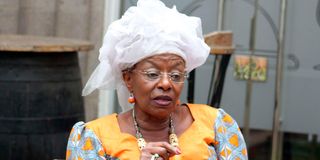Empower women economically to save them from GBV

Echo Network Africa Group CEO Dr Jennifer Riria says existing laws and policies on all forms of GBV, must be effectively implemented to end the vice.
What you need to know:
- Gender equality advocates have said economic empowerment serves as a preventive measure against GBV.
- Ludfine Bunde said empowering women and girls will not only enable them to escape GBV, but also avoid being infected with HIV.
There is a need for more investments in empowering women and girls to reduce their vulnerability to gender-based violence (GBV), gender equality advocates have said.
The advocates, who held a consultative forum with representatives from the government, civil society, and the media last week, discussed ways to end GBV in Kenya.
The participants noted that economic empowerment serves as a preventive measure against the vice. They observed that many women endure abuse to continue receiving financial support from their abusers yet they can walk away if they were economically independent.
HIV
“Economic empowerment will reduce women’s vulnerability to GBV,” Centre for Rights Education and Awareness (Creaw), Executive Director, Wangechi Wachira, observed during the forum convened by Echo Network Africa (ENA).
Joint United Nations Programme on HIV/Aids Community Support Adviser Ludfine Bunde, said empowering women and girls will not only enable them to escape GBV, but also avoid being infected with HIV.
“Sixty three per cent of all new infections in Sub-Saharan Africa (in 2021) are among women and girls. Why is this so? (It is because) of the harmful gender norms (and) masculinities,” said Ms Bunde.
“When there is violence in the household, a woman will not have the courage to go for a test. And should that woman be HIV positive, they do not take their medicine to avoid disclosure of their status. What does that mean for a pregnant woman? (It means) she ends up infecting the child.
ENA Group Chief Executive Officer Dr Jennifer Riria, reiterated that existing laws and policies on all forms of GBV, must be effectively implemented to end GBV.
Men champions
“GBV is a development issue and there needs to be a serious commitment to ending it,” she said.
She called for the inclusion of men in anti-GBV drives noting the necessity of awarding men champions to encourage more to join the campaign.
Executive Director Advocates for Social Change-Kenya Philip Otieno, however, pointed to the need to address socio-cultural issues preventing men from taking lead in combating GBV.
“Men don’t live in isolation, there are those individual issues that we have to talk about (as well as) interpersonal relations (and) institutional issues that we have to address,” he said.
“Changing one man is important, but it is naive to think that changing that one man will bring about change in society,” he added.
“If you don’t change institutional issues and structures that shape the way men behave and conduct themselves in the society, then essentially we are going nowhere.”





